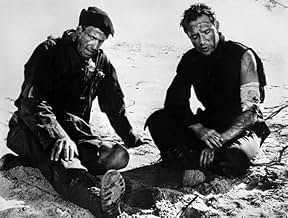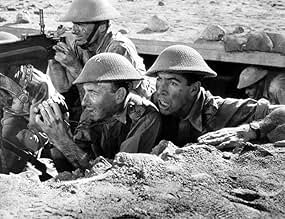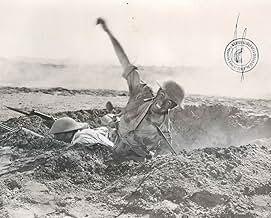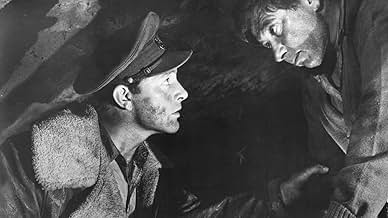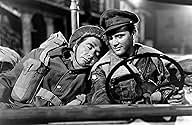Ajouter une intrigue dans votre langueRichard Burton plays a Scottish Army officer put in charge of a disparate band of ANZAC troops on the perimeter of Tobruk with the German Army doing their best to dislodge them.Richard Burton plays a Scottish Army officer put in charge of a disparate band of ANZAC troops on the perimeter of Tobruk with the German Army doing their best to dislodge them.Richard Burton plays a Scottish Army officer put in charge of a disparate band of ANZAC troops on the perimeter of Tobruk with the German Army doing their best to dislodge them.
- Nommé pour 1 Oscar
- 1 victoire et 1 nomination au total
- Lt. Harry Carstairs
- (as Charles Tingwell)
- English Officer
- (non crédité)
- Corporal
- (non crédité)
- British Officer
- (non crédité)
- Sergeant
- (non crédité)
- German Lieutenant
- (non crédité)
- German Gunner
- (non crédité)
- German Radio Man
- (non crédité)
- German Orderly
- (non crédité)
- Colonel
- (non crédité)
Avis à la une
In 1941 British and Australian troops had control of the fortress town of Tobruk in Libya. Tobruk gets surrounded by German and Italian troops as the Axis tries to take Egypt and the Suez Canal. The British high command order the Australian General Leslie Morshead to hold Tobruk for 2 months to disrupt the German supply lines. Morshead was a clever commander, trapping German tanks to make them useless and made his troops fight a tough guerrilla campaign. The main focus of the film is on a British officer, 'Tammy' MacRoberts who is given command of a fresh batch of Australian troops, including his former school master. He has to train his troops to get them ready for the battle and first the bitter war.
The acting isn't that good, the Australian accents were awful and it would have been easier if their casted Australian actors. As well their seem to be an American officer with the British and Australians ones, I don't know why? What makes the film work is the war scenes. They are well done and you get to feel the action and sweat of battle. The film is also a short, tort experience. Also there is an historical inaccuracy; the Desert Rats was the name for the 9th Armoured Division of the British Army, not the 7th Australian Army. However Rommel did call the army the rats of Tobruk.
Personally I would like to see a new film about the war in North Africa because their are many interesting stories and battles, from the Battle of El-Alamein, the story of Rommel and Montgomery, Operation Touch, the Birth of the SAS, etc... The Siege of Tobruk would also make an interesting story for a modern film.
The most fascinating part of this film is to watch both the marvelous Robert Newton and the under-rated James Mason give Richard Burton acting lessons.
Burton tends to chew the scenery when he snarls, "Good-morning," as though he were the youngest in a large family, doing anything for attention.
Newton counters Burton's unnecessary histrionics with a beautifully modulated realization of-himself in disguise as Prof. Bartlett, Burton's old instructor. I think this is the most honest look at the REAL Newton on film. The rueful man who clearly understands his inability to stay sober, but still has enough control to see his own and everyone else's situation clearly. He is the kind, timorous, brilliant failure who, in one burst of glory, up-stages his more successful juniors. Newton delivers a truly magical performance.
James Mason also delivers a balanced and multi-layered Rommel. Of course he practiced playing this brilliant German General in the better-known film, The Desert Fox.
Burton comes across as pure ham in The Desert Rats, but there IS one scene he has where he is honest and effective. He explains to Bartlett that the picture of the young woman in his wallet is his wife. The picture actually IS Burton's wife, pre-Elizabeth Taylor.
Otherwise, although Burton is billed as the star, the film belongs to Newton and Mason. See it for the pleasure of their company.
One of the most realistic and best of the fifties war movies with excellent direction by Robert Wise
This reconstruction of a phase in the battle of Tobruk(deeds also filmed by Arthur Hiller in ¨Tobruk¨ with Rock Hudson) is correctly based on true events, though excessive importance for the Aussies. The actual deeds are based on series of engagements between British and Axis forces over Libyan port. Occupied by Italy 1911, Tobruk was taken by Britain in Operation Battleaxe 1941.It was captured by Field Marshal Erwin Rommel June 1942 after the retreat of the main British force to Egypt, and this precipitated General Sir Claude Auchinleck's replacement by General Bernard Montgomery as British commander. Montgomery recovered it after the second of Battle of El Alamein and it remained in British hands for the rest of the war.
Despite it's age, most of the attempts at special effects (artillery in the distance, explosions done via matte) come off well. As for the scenes where they really shoot off some pyrotechnics, they spared no expense! The overall portrait of the desert and army life looks very real and has the ring of truth. The plot is exciting and never drags.
The only problems are the over-patriotic script (I guess we should cut them some slack here, this movie was made much closer to the war than we are today!) and as noted elsewhere, the inappropriate German weapons. It's amazing that they used Thompson machine guns instead of MP40's, when for the next 30 years everybody from "The Man from U.N.C.L.E." to James Bond would use the MP40 all over the place. In summary I think this movie was a bit better than I expected and holds up well to repeated viewings.
Le saviez-vous
- AnecdotesThe film was banned in Egypt, as the British were still occupying the Suez Canal and the Sudan.
- GaffesDuring the raid on the German camp there is a sign on a building reading "Hauptquartiers". Although the English word "Headquarters" might suggest a plural s, in German there doesn't exist such a form. The correct word would be "Hauptquartier" and the plural "Hauptquartiere"
- Citations
Tom Bartlett: You don't know much about real fear, Tammy. Maybe it comes with age or the bottle. You don't know what it is to be a coward... really a coward. To know it, yet to hope one day something will happen to prove that you're not, yet half the time not really believing that either.
- Crédits fousOpening credits prologue: 1941 LIBYAN DESERT NORTH AFRICA
- ConnexionsEdited into La guerre, la musique, Hollywood et nous... (1976)
- Bandes originalesWaltzing Matilda
(1895) (uncredited)
Original music by Christina Macpherson (1895)
(Based on the Scottish tune "Craigielee", music by James Barr, with words by Robert Tannahill)
Revised music by Marie Cowan (1903)
Lyrics by A.B. 'Banjo' Paterson (1895)
Played during the opening credits and often in the score
Meilleurs choix
- How long is The Desert Rats?Alimenté par Alexa
- Chicago Openeing Happened When?
Détails
Box-office
- Budget
- 1 320 000 $US (estimé)
- Durée1 heure 28 minutes
- Couleur
- Rapport de forme
- 1.37 : 1
Contribuer à cette page



